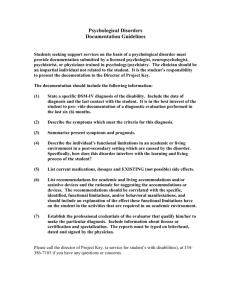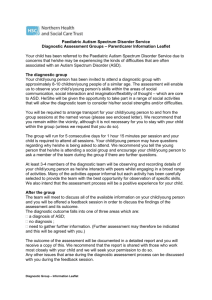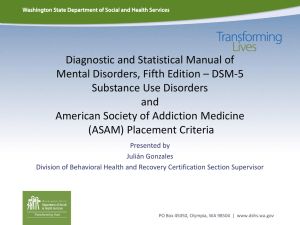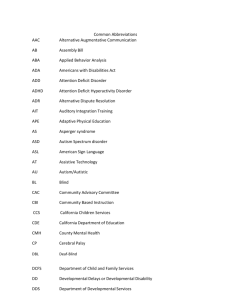Read The Arc`s letter here.
advertisement
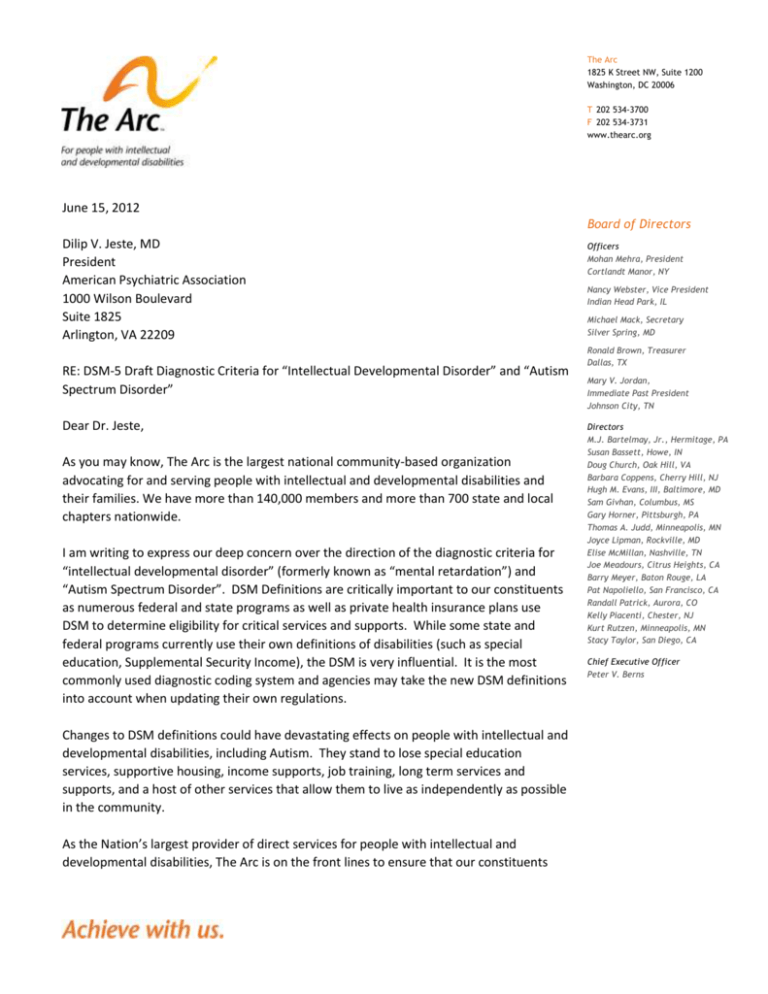
The Arc 1825 K Street NW, Suite 1200 Washington, DC 20006 T 202 534-3700 F 202 534-3731 www.thearc.org June 15, 2012 Board of Directors Dilip V. Jeste, MD President American Psychiatric Association 1000 Wilson Boulevard Suite 1825 Arlington, VA 22209 RE: DSM-5 Draft Diagnostic Criteria for “Intellectual Developmental Disorder” and “Autism Spectrum Disorder” Dear Dr. Jeste, As you may know, The Arc is the largest national community-based organization advocating for and serving people with intellectual and developmental disabilities and their families. We have more than 140,000 members and more than 700 state and local chapters nationwide. I am writing to express our deep concern over the direction of the diagnostic criteria for “intellectual developmental disorder” (formerly known as “mental retardation”) and “Autism Spectrum Disorder”. DSM Definitions are critically important to our constituents as numerous federal and state programs as well as private health insurance plans use DSM to determine eligibility for critical services and supports. While some state and federal programs currently use their own definitions of disabilities (such as special education, Supplemental Security Income), the DSM is very influential. It is the most commonly used diagnostic coding system and agencies may take the new DSM definitions into account when updating their own regulations. Changes to DSM definitions could have devastating effects on people with intellectual and developmental disabilities, including Autism. They stand to lose special education services, supportive housing, income supports, job training, long term services and supports, and a host of other services that allow them to live as independently as possible in the community. As the Nation’s largest provider of direct services for people with intellectual and developmental disabilities, The Arc is on the front lines to ensure that our constituents Officers Mohan Mehra, President Cortlandt Manor, NY Nancy Webster, Vice President Indian Head Park, IL Michael Mack, Secretary Silver Spring, MD Ronald Brown, Treasurer Dallas, TX Mary V. Jordan, Immediate Past President Johnson City, TN Directors M.J. Bartelmay, Jr., Hermitage, PA Susan Bassett, Howe, IN Doug Church, Oak Hill, VA Barbara Coppens, Cherry Hill, NJ Hugh M. Evans, III, Baltimore, MD Sam Givhan, Columbus, MS Gary Horner, Pittsburgh, PA Thomas A. Judd, Minneapolis, MN Joyce Lipman, Rockville, MD Elise McMillan, Nashville, TN Joe Meadours, Citrus Heights, CA Barry Meyer, Baton Rouge, LA Pat Napoliello, San Francisco, CA Randall Patrick, Aurora, CO Kelly Piacenti, Chester, NJ Kurt Rutzen, Minneapolis, MN Stacy Taylor, San Diego, CA Chief Executive Officer Peter V. Berns receive the services and supports to which they are entitled by law and implementing regulations. Toward this end, we urge the APA to consider the following recommendations: I Intellectual Developmental Disorder While The Arc supports replacing the outdated and stigmatizing term “mental retardation,” we have several concerns about the APA’s proposed new term, “Intellectual Developmental Disorder” and how it is defined. Our comments are consistent with those developed by the American Association on Intellectual and Developmental Disabilities (AAIDD). 1) The DSM-5 should adopt the term “intellectual disability” to replace “mental retardation,” rather than the proposed “intellectual developmental disorder.” “Intellectual disability” is the preferred term to replace “mental retardation” as U.S. laws and regulations are being rewritten. Adoption of the term of “intellectual disability” is well underway in the Department of Education, Social Security Administration, Centers for Medicare and Medicaid Services, Department of Health and Human Services, Department of Justice, Centers for Disease Control and Prevention, and many state government agencies. In fact, “Rosa’s Law” (P.L. 111-256) was enacted in 2010 to replace the term “mental retardation” with “intellectual disability” in federal education, health, and labor laws. Internationally, there is near unanimous usage of the term “intellectual disability.” Promoting the term “intellectual developmental disorder” is certain to lead to confusion among those who establish eligibility criteria for the services needed by many children and adults. People with intellectual disability whose diagnosis is the basis for early intervention, health care, training, employment, citizenship, and civil and criminal justice determinations could find their eligibility for services disrupted should this term be used. The APA has noted in its rationale that it is seeking to harmonize its terminology with the upcoming version of the International Classification of Diseases. While there is a draft International Classification of Diseases (ICD-11) open for public comment with this term, the document is in draft form and likely to change substantially before it is finalized in 2015 (their website clearly indicates that the document not final, not approved by the World Health Organization (WHO), and not to be used in practice except for field trials). Therefore, there is no rational argument to harmonize DSM-5 terminology with the draft ICD-11. 2) There should be direct alignment of the DSM-5 definition of “intellectual disability” with the definition used by the American Association on Intellectual and Developmental Disabilities (AAIDD): “Intellectual disability is characterized by significant limitations both in intellectual functioning and in adaptive behavior as expressed in conceptual, social, and practical adaptive skills. This disability originates before age 18.” Having the APA and AAIDD, the two most authoritative manuals in the country defining “intellectual disability” using different terminology and different definitions would cause significant confusion in state and federal eligibility determinations, in service delivery systems, and the courts. In the past, the APA and AAIDD definitions were closely aligned. 3) The DSM-5 should operationally define the “developmental period” as ending at the age of 18 years. The proposed definition of intellectual developmental disorder includes the criterion “All symptoms must have an onset during the developmental period.” Leaving the age at which the developmental period ends open to interpretation will cause confusion and result in inconsistent use of developmental periods across states and jurisdictions. In addition to a reduction in diagnostic reliability, the lack of clear guidance could serve as the basis of denying supportive services and criminal protections to individuals who would otherwise be entitled to them. 4) Any changes to the diagnostic criteria for “mental retardation” in the DSM-5 should be field tested. While we strongly support replacing the outdated and stigmatizing term “mental retardation” that is used in the current version of the DSM, any changes to the diagnostic criteria must undergo rigorous testing in the field in order to ascertain the impact of such changes on the ability to obtain a diagnosis. However, “mental retardation” was not one of the diagnoses that APA selected for field testing. Any changes to the diagnosis of “mental retardation”, which affects millions of individuals in the U.S. throughout their lives, should not be made without first assessing the feasibility, clinical utility, reliability, and validity of the draft criteria. 5) The DSM-5 should consistently adopt the term “adaptive behavior” rather than “adaptive functioning.” We recommend that (a) Criterion B be labeled “adaptive behavior,” (b) that its definition be “deficits in adaptive behavior refers to deficits in conceptual, social, or practical skills,” and (c) that the following sentence be removed entirely: “the limitations result in the need for ongoing support at school, work, or independent life.” Adaptive behavior and adaptive functioning are two different concepts. In short, “adaptive behavior” are the conceptual, social, and practical skills a person may have, while “adaptive functioning” is how well or independently the person is able to use those skills to handle common demands in life. In Criterion B, which should describe “adaptive behavior” for the purposes of a diagnosis, is instead a picture of “global adaptive functioning” which results in part from the diagnosis itself. Such term confusion undermines consistent measurement, assessment, and diagnosis, making valid field testing impossible. II Autism Spectrum Disorder While The Arc supports the development of diagnostic criteria that accurately and reliably identify individuals in order to provide effective intervention and supports, we are greatly concerned about the process for revising the diagnostic criteria. Our comments are consistent with and incorporate several of the specific points from those developed by the Association of University Centers on Disabilities (AUCD), Autism Speaks, and the Autistic Self Advocacy Network (ASAN). 3 A few recently published studies have attempted to evaluate the validity of the proposed DSM-5 criteria in comparison with current DSM-IV criteria. They have had mixed results in correctly identifying children who have ASD, with a percentage (ranging from 13-39%) of individuals, mostly with higher IQs and less severe symptoms, no longer meeting the criteria for ASD under the new DSM-5 guidelines. They have, however, shown improvements in fewer children being incorrectly diagnosed with ASD. In addition, several preliminary studies suggest that the proposed changes will reduce the overall number of children who receive a diagnosis of ASD. Concerns have been raised about the methodology used in these studies, specifically their use of retrospective data. There have, however, been a few field trials conducted to date on the DSM-5. While the field trials have not shown a drop in the number of persons receiving an ASD diagnosis, the sample size used for the field trials is small (N = 83 with ASD) and they only included children. Given the limitations of the current studies on the proposed diagnostic criteria and the very significant potential effects that they could have on our constituents, The Arc makes the following recommendations: 1) We recommend that all information on the research studies on the proposed Autism Spectrum Disorder diagnosis be made available to the public before finalizing the DSM-5. It is critical to consider all of the research studies in order to make truly informed decisions about revising diagnostic criteria. 2) We recommend that prospective data be obtained as part of the field studies on the proposed changes for DSM-5. These studies should include large sample sizes of adolescents and adults (as these older individuals may have developed coping mechanisms that “mask” the symptoms of ASD) and on historically underserved groups such as racial and ethnic minorities, and females. 3) Until further studies can be conducted and made available to the public, we recommend lowering the number of symptoms required for an ASD diagnosis in the proposed social communication domain from three to two. Until thorough studies are able to show that the DSM-5 will not withdraw an ASD diagnosis from people who require support for ASD symptoms, we recommend that the APA lower the requirement for the proposed Criterion A symptoms from three of three symptoms present to two of three symptoms present. 4) We recommend conducting research on the proposed diagnosis of Social Communication Disorder before the DSM-5 is finalized. We understand that the newly proposed Social Communication Disorder has also been is intended to capture those individuals with social and communicative impairments but who do not show restrictive 4 and repetitive behaviors. The implications of this new diagnosis are unclear, both in terms of diagnostic precision and eligibility for services. We urge further study before the DSM-5 is finalized. In sum, we are very concerned about APA’s proposed departure from AAIDD’s definition and diagnostic criteria for intellectual disability and strongly encourage APA to turn to AAIDD and its definition and diagnostic criteria in its DSM-5. We are equally troubled by the APA’s plan to move forward with a new diagnosis of Autism Spectrum Disorder while the research is yet incomplete and its methodology limited. While we appreciate the enormity of the task at hand to update the numerous diagnoses, we urge caution in making fundamental changes without the appropriate consideration of concerns raised by individuals and organizations most affected by such changes. Please do not hesitate to contact us for additional information or clarification. Respectfully, Peter V. Berns Chief Executive Officer cc: John Oldman, MD, Immediate Past President Jeffrey A. Lieberman, President-elect David J. Kupfer, MD, DSM-5 Task Force Chair Darrel A. Regier, MD, MPH, DSM-5 Task Force Vice-Chair Susan Swedo, MD, DSM-5 Neurodevelopmental Disorders Work Group Chair James Harris, MD, Neurodevelopmental Disorders Work Group Shekhar Saxena, MD, Director, Department of Mental Health and Substance Abuse, WHO 5



